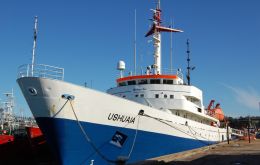MercoPress. South Atlantic News Agency
Stories for October 2011
-
Thursday, October 27th 2011 - 15:50 UTC
Brazilian central bank suggests ‘moderate’ cuts to interest rates

Brazil’s central bank said slowing global growth will have a large enough disinflation impact and allow policy makers to carry out “moderate” cuts to interest rates.
-
Thursday, October 27th 2011 - 15:43 UTC
Argentine insurance companies ordered to repatriate foreign investments

In a further attempt to ease the pressure on the dollar and decrease the outflow of the Central Bank's foreign currency reserves, the Argentine government ordered insurance companies to repatriate their foreign investments.
-
Thursday, October 27th 2011 - 06:52 UTC
Argentine Navy captain ‘Angel Face’ Astiz sentenced to life imprisonment

Two notorious former Argentine navy officers Alfredo Astiz and “Tigre” Acosta were sentenced to life in prison on Wednesday night after being found guilty of kidnapping, torture and the forced disappearances of many detainees in the former Navy School of Mechanics (ESMA) during the last dictatorship (1976/1983).
-
Thursday, October 27th 2011 - 06:24 UTC
Brazilian Sports minister resigns: fifth to be forced out over corruption allegations

Brazil's sports minister resigned on Wednesday over a corruption scandal, the country's GloboNews television station said, reviving concern over President Dilma Rousseff's unstable ruling coalition and the country's lagging preparations for the 2014 World Cup.
-
Thursday, October 27th 2011 - 06:24 UTC
Ushuaia feeling the pinch from Chile’s seduction policy to attract cruise vessels

Argentina’s extreme south city and Antarctica cruise hub, Ushuaia is feeling the pinch from the latest Chilean measures to attract more vessels and is requesting a costs adjustment to improve competition conditions.
-
Thursday, October 27th 2011 - 06:14 UTC
South Chile Hudson volcano erupts: fears it could repeat events of 1991

Chile said on Wednesday it was evacuating residents from around the Hudson volcano in the country far south after it spewed a jet of steam a kilometre into the air and seismic activity triggered an avalanche.
-
Thursday, October 27th 2011 - 06:05 UTC
EU leaders reach a deal on Greek debt and boosting bailout fund to 1.4 trillion

European Union leaders announced an agreement early Thursday in Brussels on debt crisis measures including a hard-fought deal with private sector investors to write down Greek bonds by 50%.
-
Thursday, October 27th 2011 - 05:58 UTC
World Bank forecasts Latam growth of 3.5% to 4% this year and 4% in 2012

Latin America’s economy is forecasted to grow between 3.5% and 4% this year, which is less than previous estimates before the current global financial crisis, said World Bank representative for the region, Pamela Cox.
-
Thursday, October 27th 2011 - 05:52 UTC
In anticipation of global crisis World Bank extends 260m loan to Uruguay

The World Bank Board approved a 260 million dollars loan to support the Uruguayan government’s reform program in order to consolidate growth with social equity and provide a line of financing to address the impact of the current uncertainty in global economic affairs.
-
Thursday, October 27th 2011 - 05:47 UTC
Uruguay’s flock at a historic low; number of cattle below 11 million

The latest update of Uruguay’s livestock census for the year ending last June 30 shows the number of cattle is below eleven million and the flock at its lowest since colonial times with 7.3 million head.
